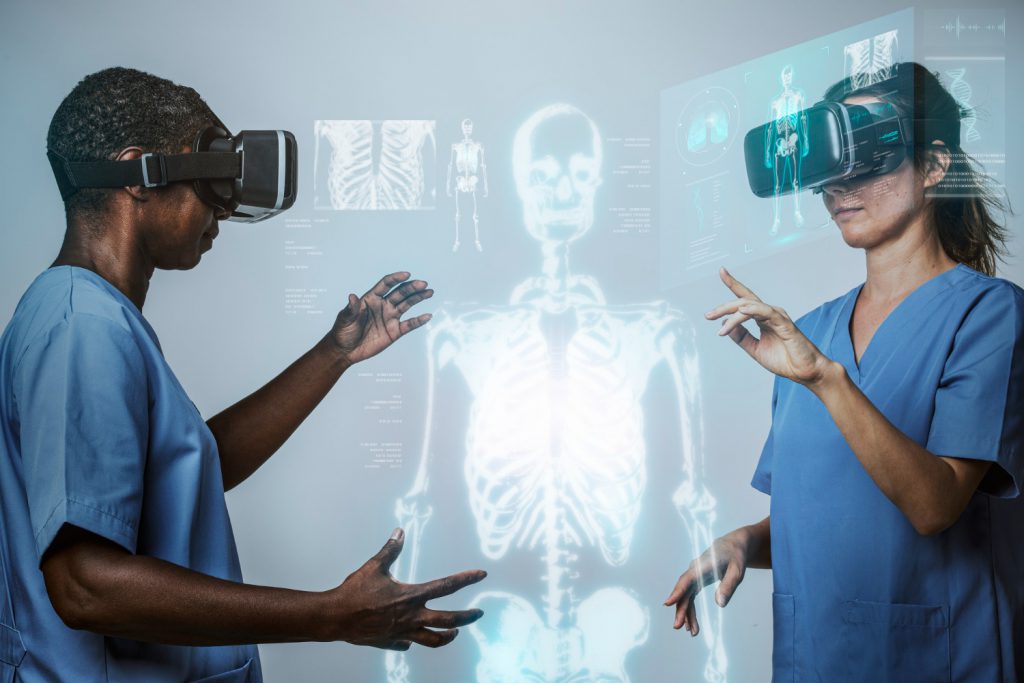Enterprise Application Use cases in Metaverse – Healthcare
As internet technology evolution goes through its next iteration with the Metaverse coming into its own in the past few years, there is a great deal of excitement in the tech world about its potential and possibilities.
With Metaverse gaining traction, developers and companies are finding novel ways of applying it to real-life use cases facilitating the industry’s growth at an exponential rate.
Enterprise Metaverse use cases-Healthcare
The Metaverse offers innovative opportunities to businesses. Here are some use cases where it can favorably impact the healthcare delivery model in the following areas:
Telepresence
Metaverse in healthcare has introduced new avenues for offering treatments at subsidized rates and in geographical locations that health providers may not be able to visit through telepresence. Virtual 3D clinics offer an easy and convenient way for patients and doctors to interact with each other. They are especially effective in the case of minor health conditions where a doctor could diagnose a patient without any physical examination and all that is needed is for the patient and doctor to have headsets.
Mental health is another area where metaverse could prove beneficial. Through immersive VR experiences, psychiatrists could treat disorders like PTS (post-traumatic stress), Anxiety, Delusions, Eating disorders, and so on.
gameChange is a landmark Virtual Reality Therapy that treats patients who suffer from psychosis – it targets the extreme anxiety that keeps patients from participating in day-to-day activities. The trial results showed that the treatment was effective and extremely popular among patients with high uptake rates.
Decentralized storage through Blockchain
Blockchain is a key technology that drives the metaverse. The management and security of highly sensitive and valuable health data is the most significant application of Blockchain in healthcare. Blockchains allow for data to be stored securely through decentralized, distributed, and encrypted databases. When a patient’s health records are stored on a blockchain, it makes them difficult to hack. They are also easily accessible when a patient gives consent to a doctor to review his records just with the click of a button.
Digital Twins
Digital twins are virtual models or simulations of any process, system, or object that generate real-world data with the purpose of learning more about the real-world counterpart. In the metaverse, Digital twins can be used to create ‘test dummies’ for individuals which can be used to predict outcomes, e.g.: response to specific medications, recovery from surgery and illness, and so on. Med-tech companies like Siemens Healthineers and GE Healthcare are investing in digital twin technology.
Precision Surgery through AR/VR
Immersive Augmented Reality (AR), Virtual Reality (VR), and AI technologies are helping surgeons to perform minimally invasive and more precise surgeries by getting a 3D view of the patient’s body which helps them to plan and perform operations.
Moreover, the data gathered from the patient’s digital twin will help them to predict recovery duration, possible complications, and prescribed treatments if complications arise post the surgical procedure.
Zimmer Biomet’s OptiVu Mixed Reality platform uses Microsoft Hololens2 to offer a mixed-reality world that offers innovative solutions to streamline surgical planning and workflow and offers real-time support that enables surgeons and care teams to collaborate and improve patient outcomes.
Training
Traditional medical training offers limited resources for the practice of surgeries partly because dissection procedures on cadavers prove to be costly for hospitals. With VR, students can train in a simulated environment at a significantly lower cost.
Dissection on a virtual cadaver improves learning outcomes as it enables students to work individually. It enhances students’ technical capabilities such as precision and decision-making skills and is cost-effective too.
Collaboration
Instant sharing of information between doctors and support staff will ultimately lead to quicker diagnosis and quality healthcare service.
Veyond Metaverse offers XR technology solutions that augment and improve medical education and training, surgical planning and procedures, and diagnosis and treatments through its proprietary cloud communication platform.
Conclusion
Metaverse has created a new and unique world full of possibilities and opportunities for a diverse variety of businesses.
Although the early adopters might need to prepare for the challenges it presents currently, they will certainly gain a competitive edge by leveraging the immense potential of this field.

